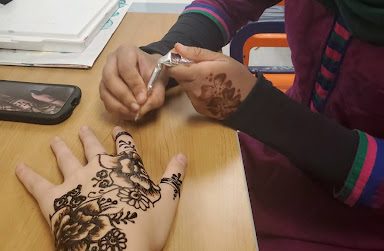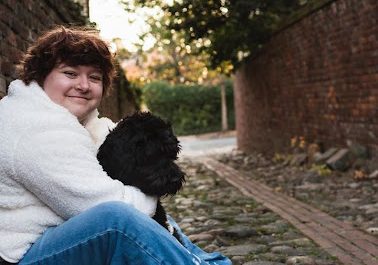
Henna, a traditional form of decorative body art, is practiced worldwide, but most commonly seen in Middle Eastern, African and South Asian cultures. Henna Club aims to create a space for both current and aspiring henna artists as well as enthusiasts, and it plans to open up soon.
“I wanted to open this club for fun. I like to do henna, and it was a great excuse for me to practice more and help others around me learn it,” said Henna Club co-president and senior Maya Gosai. “I also wanted to help people understand that art comes in different forms and can often be tied to culture.”
Despite its widespread use, some are misinformed about henna. After the initial request was put in for club approval, officers received a forwarded email from the Risk Management (RM) team. The email highlighted RM’s response from last year, stating that henna is not FDA approved and deemed too similar to tattooing according to the FCPS prohibited student activities list.
“I did not expect my request to be rejected,” said Gosai. “My first reaction was confusion and a bit of anger. I did consider RM’s response to be insensitive.”
Tattooing is one activity amongst other prohibited activities on the list. Henna, however, is not explicitly mentioned.
“I think they had a very Western view of henna, and that may be why they compared it to tattooing,”said Gosai. “There is no evidence claiming natural henna art is associated with derogatory connotation. All henna designs are of cultural significance and represent diversity, peace and prosperity.”

Along with the concern of henna being too similar to tattooing, questions were also raised about the effects of henna being applied to skin. Henna is a paste made from ground, dried leaves of the henna plant, typically mixed with sugar, water and sometimes essential oils. While making henna paste from scratch is common, not all artists choose to do so, as buying pre-made henna cones can be considered as less tedious and easily accessible.
“It’s not all chemical. There have been a lot of people that come to me saying, ‘I want a tattoo, but I don’t know if my parents will allow me,’ because their parents think that it’s going to harm their skin,” said Henna Club co-president and junior Samarah Jahangir. “I just want people to know that it’s not all bad, and real henna is natural and has benefits for your skin.”
Henna has its roots in various cultures, and is regarded as a fun and meaningful activity during cultural and religious events.
“In many Muslim countries, we all celebrate with henna the night before Eid,” said Jahangir. “In Bangladesh, and in other countries, we also apply henna during weddings as part of the bridal festivities.”
Hoping to meet once a month, the Henna Club has several activities planned to honor and utilize the practice of henna.
“We plan to hold club meetings where the officers will lead tutorials, showing everyone how to create small designs step by step,” said Jahangir. “I was also thinking of partnering with another club, such as UNICEF, to raise money for more countries and causes in need. I want henna to become well-known and appreciated.”






